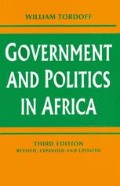Abstract
Chapter 3 assessed the contribution made by political parties to the achievement of independence. In this chapter I examine the role that political parties have played since independence and, at the risk of repeating some of the points made in the introduction, I begin by drawing attention to certain political patterns which took shape. Then, I look again at the rejection by a majority of black African states of one-party rule and military authoritarianism, and ask what effect the movement towards political pluralism has had, or is likely to have, on the functions of political parties.
Preview
Unable to display preview. Download preview PDF.
Further Reading
Agbaje, A., ‘Freedom of the Press and Party Politics in Nigeria: Precepts, Retrospect and Prospects’, African Affairs, vol. 89, no. 355 (April 1990).
Barkan, J. D., with Okumu, J. J. (eds), Politics and Public Policy in Kenya and Tanzania (New York and London: Praeger, 1979).
Baylies, C. and Cohen, R. (eds), ‘Workers, Unions and Popular Protest’, Review of African Political Economy, no. 39 (1987) — the focus is on West and South Africa.
Charlton, R., ‘Bureaucrats and Politicians in Botswana’s Policy-Making Process: A Re-Interpretation’, Journal of Commonwealth and Comparative Politics, vol. xxix, no. 3 (November 1991).
Donge, J. K. van, ‘Kamuzu’s legacy: the democratization of Malawi’, African Affairs, vol. 94, no. 375 (April 1995).
Gertzel, C. (ed.), Baylies, C. and Szeftel, M., The Dynamics of the One-Party State in Zambia (Manchester University Press, 1984).
Jeffries, R. and Thomas, C., ‘The Ghanaian Elections of 1992’, African Affairs, vol. 92, no. 368 (July 1993); for the dissenting views of M.Oquaye and A.Boahen, see ibid., vol. 94, no. 375 (April 1995).
Lodge, T., ‘The South African general election, April 1994: results, analysis and implications’, African Affairs, vol. 94, no. 377 (October 1995).
O’Brien, D. B. Cruise, Dunn, J. and Rathbone, R. (eds), Contemporary West African States (Cambridge University Press, 1989).
Pratt, C., The Critical Phase in Tanzania, 1945–68. Nyerere and the Emergence of a Socialist Strategy (Cambridge University Press, 1976).
Randall, V. (ed.), Political Parties in the Third World (London: Sage, 1988), which contains chapters on Ghana by R. Pinkney and on Zambia by W. Tordoff.
Rosberg, C. G. and Callaghy, T. M. (eds), Socialism in Sub-Saharan Africa: A New Assessment (Berkeley: Institute of International Studies, University of California, 1979).
Vengroff, R., ‘Political Parties and the Party System in Mali’, Journal of Modern African Studies, vol. 31, no. 4 (1993).
Young, T., ‘The Politics of Development in Angola and Mozambique’, African Affairs, vol. 87, no. 347 (April 1988), and ‘The MNR/RENAMO: External and Internal Dynamics’, ibid., vol. 89, no. 357 (October 1990).
Author information
Authors and Affiliations
Copyright information
© 1997 William Tordoff
About this chapter
Cite this chapter
Tordoff, W. (1997). Political Parties. In: Government and Politics in Africa. Palgrave, London. https://doi.org/10.1007/978-1-349-25789-8_5
Download citation
DOI: https://doi.org/10.1007/978-1-349-25789-8_5
Publisher Name: Palgrave, London
Print ISBN: 978-0-333-69474-9
Online ISBN: 978-1-349-25789-8
eBook Packages: Palgrave Political & Intern. Studies CollectionPolitical Science and International Studies (R0)

